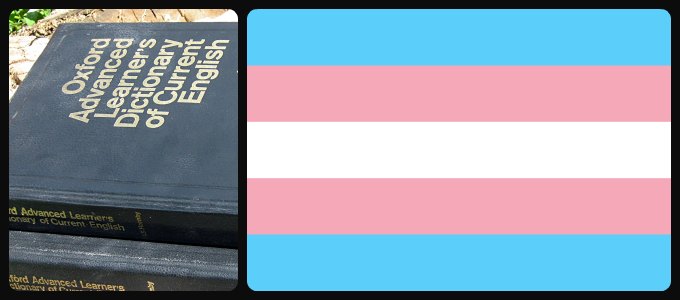The Oxford English Dictionary added "cisgender," the opposite of "transgender," to its pages. (Photos of Oxford English Dictionaries and the transgender flag courtesy of Wikimedia Commons.)
When it rains, it pours — in a good way.
Last week, the U.S. Supreme Court made same-sex marriage legal across the nation, and this week, the word cisgender was one of some 500 new additions to the Oxford English Dictionary.
The word is defined as “designating a person whose sense of personal identity corresponds to the sex and gender assigned to him or her at birth.”
People may be more familiar with the word transgender, but according to James Morton, transgender alliance manager at the Equality Network charity, the word cisgender is a useful, neutral term that has been increasing in popularity for some time. According to OED’s compilers, the word emerged in the late 1990s. The prefix “cis-” from Latin means “on this side of,” and typically forms words in contrast to “trans.”
“Its addition to the Oxford English Dictionary reflects the significant increase in discussion of gender diversity over recent years,” Morton said in a recent article in U.K. newspaper The Independent. “We welcome the increased awareness of its meaning which this inclusion will bring.”
The word is certainly a welcome addition to the lexicon given the LGBT community’s increasingly high profile, not to mention the historic changes that have taken place around gender identity issues. Wouldn’t it be stunning if we could go the other route and eliminate some words from the dictionary because they’d gone out of fashion or no longer exist? One can hope.















